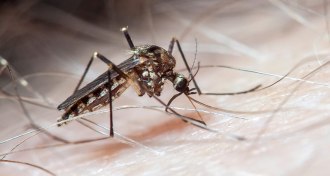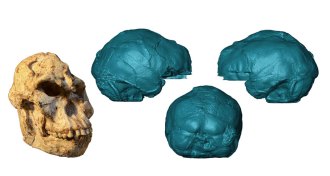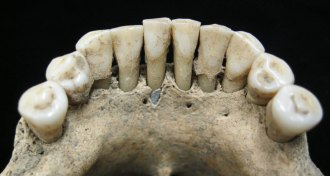Humans
Sign up for our newsletter
We summarize the week's scientific breakthroughs every Thursday.
-
 Anthropology
AnthropologyDogs may have helped ancient Middle Easterners hunt small game
Jordanian finds point to pooch-aided hunting of small prey around 11,500 years ago, offering new clues into dog domestication in the Middle East.
By Bruce Bower -
 Health & Medicine
Health & MedicineLack of sleep is tied to increases in two Alzheimer’s proteins
In people and mice deprived of sleep, researchers found an increase in tau, a protein involved in Alzheimer’s disease, in the fluid bathing the brain.
-
 Health & Medicine
Health & Medicine‘Good to Go’ tackles the real science of sports recovery
In ‘Good to Go,’ science writer Christie Aschwanden puts science — and herself — to the test for the sake of sports recovery.
-
 Archaeology
ArchaeologyOur fascination with robots goes all the way back to antiquity
In the book ‘Gods and Robots,’ a scholar recounts how early civilizations explored artificial life through myths.
By Bruce Bower -
 Health & Medicine
Health & MedicineOverdose deaths tied to antianxiety drugs like Xanax continue to rise
Benzodiazepines, widely used but addictive drugs to treat anxiety and insomnia, are contributing to a growing number of overdose deaths.
-
 Animals
AnimalsBacterial compounds may be as good as DEET at repelling mosquitoes
A bacterium’s metabolic by-products are as effective as DEET in deterring Aedes aegypti mosquitoes.
-
 Anthropology
AnthropologyAn ancient child from East Asia grew teeth like a modern human
Choppers from a youngster with an unknown evolutionary background indicate that hominids evolved a humanlike life span in East Asia by 100,000 years ago.
By Bruce Bower -
 Health & Medicine
Health & MedicineA new 3-D printed ‘sponge’ sops up excess chemo drugs
Researchers have created “sponges” that would absorb excess cancer drugs before they spread through the body and cause negative side effects.
-
 Psychology
PsychologyEasing test anxiety boosts low-income students’ biology grades
Wealthier students outperform their less advantaged peers in math and science. Decreasing test anxiety may help even the playing field.
By Sujata Gupta -
 Anthropology
Anthropology‘Little Foot’ skeleton reveals a brain much like a chimp’s
An ancient skeleton dubbed Little Foot points to the piecemeal evolution of various humanlike traits in hominids, two studies suggest.
By Bruce Bower -
 Health & Medicine
Health & MedicineThis protein may help explain why some women with endometriosis are infertile
Infertile women with endometriosis have a reduced amount of a protein found to be important for establishing pregnancy in mice, a study finds.
-
 Anthropology
AnthropologyPaint specks in tooth tartar illuminate a medieval woman’s artistry
Tooth tartar unveils an expert female manuscript painter buried at a German monastery.
By Bruce Bower